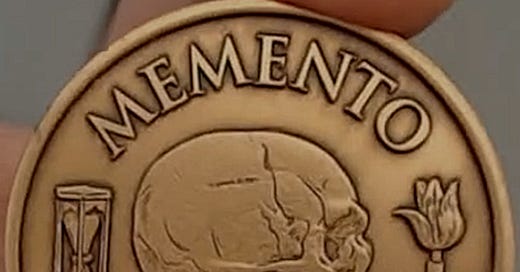In this episode, "Memento Mori: Remember You Must Die," we take on a philosophical journey exploring the significance of embracing our mortality. From discussing the potential consequences for businesses if the owner passes away unprepared to unraveling the concept of "amor fati" and the importance of releasing attachments, we delve into the profound impact of acknowledging our impermanence. The episode examines the importance of mindfulness, detachment, and embracing stoic philosophy to lead a more purposeful life. We introduce the idea of time usage, distinguishing between "dead time" and "alive time," and emphasize the significance of being present in moments rather than succumbing to distractions.
Throughout the episode, various philosophical perspectives and historical examples are presented to underscore the need for reflecting on impermanence, values, gratitude, and mindful living. Finally, we encourage listeners to engage in uncomfortable conversations about death and take the necessary steps to plan for the future and leave a meaningful legacy.
Join us as we reflect on the value of time, the need for mindful living, and the powerful wisdom of stoic philosophy. Whether you're seeking a deeper understanding of life's fleeting nature or looking for practical insights on making each moment count, this episode will surely leave you enriched and inspired.
Enjoy the episode!
YouTube: https://youtu.be/8rbCnpRWVdo
Show Notes: https://www.thesocialchameleon.show/Memento-Mori
You can listen to the episode on Apple Podcasts, Spotify, Overcast, Pocket Casts, Castbox, YouTube Music, Amazon Music, Audible, Substack, or your favorite podcast platform.
Additional Concepts Related to Memento Mori
Remember that you must die
Memento Mori, while directly translated as "Remember that you must die," encompasses a broader set of philosophical reflections on life, mortality, and the nature of existence. Here are some additional concepts related to Memento Mori:
Impermanence: Reflecting on the transient nature of all things, not just life but also experiences, relationships, and material possessions. Understanding that everything is subject to change and decay can lead to a more mindful and appreciative approach to life.
Prioritization of Values: Considering the brevity of life encourages individuals to assess their values and priorities. What truly matters in the face of mortality? This reflection can guide decisions and actions toward more meaningful pursuits.
Carpe Diem (Seize the Day): Embracing the present moment and making the most of opportunities becomes essential when one acknowledges the uncertainty of the future. Memento Mori encourages individuals to actively engage with life rather than postponing necessary actions or experiences.
Legacy and Impact: Contemplating one's mortality often leads to reflections on the legacy one will leave behind. How will you be remembered? What impact will you have on the world and the people around you? These questions can guide choices and actions.
Humility: Recognizing our mortality can foster a sense of humility. Understanding that everyone shares the common fate of mortality can diminish arrogance and promote a more compassionate and understanding attitude toward others.
Gratitude: The awareness of life's impermanence can lead to a deeper appreciation for the present moment and the blessings one currently possesses. Gratitude for life's experiences, relationships, and opportunities becomes a central theme.
Spiritual Reflection: Memento Mori often leads to spiritual contemplation. Whether through religious beliefs or a more secular spirituality, reflecting on the transient nature of life can prompt individuals to seek meaning beyond the material world.
Preparation for Death: Rather than fearing death, Memento Mori encourages a more pragmatic and accepting view of the inevitable. This may involve practical preparations for the end of life, such as writing a will or communicating end-of-life wishes.
Mindful Living: The idea of Memento Mori encourages individuals to live with intention and awareness. Acknowledging our limited time allows people to make choices that align with their values and contribute to a more fulfilling life.
Integration into Daily Life: Memento Mori is not just a philosophical concept but a practical reminder to infuse everyday actions with a consciousness of mortality. From decision-making to interactions with others, this awareness can guide a more purposeful and intentional way of living.
SELECTED LINKS FROM THE EPISODE
Memento Mori Quotes
Marcus Aurelius wrote, “You could leave life right now. Let that determine what you do and say and think.”
Epictetus urged his students: “Keep death and exile before your eyes each day, along with everything that seems terrible— by doing so, you’ll never have a base thought nor will you have excessive desire.”
Seneca urged in his Moral Letters to Lucilius, “Let us prepare our minds as if we’d come to the very end of life. Let us postpone nothing. Let us balance life’s books each day…The one who puts the finishing touches on their life each day is never short of time.”
"It is not that we have a short time to live, but that we waste much of it." - Seneca.
Amor Fati (Love of Fate)
Stoics encourage the acceptance and even love of one's fate, regardless of whether it appears favorable or unfavorable. This concept underscores the idea that challenges and setbacks are opportunities for personal growth.
Related Articles
Death Date Calendar's
Stoic Book's
Meditations by Marcus Aurelius
Discourses and Selected Writings by Epictetus
Letters from a Stoic by Seneca
Stoic Books Not Mentioned
Ryan Holiday - He writes about Stoicism, reference his collection
Related Episodes
thesocialchameleon.show/what-is-water
thesocialchameleon.show/radical-acceptance
thesocialchameleon.show/complaining/
thesocialchameleon.show/focusing-on-you
Connect With Us
Facebook | Instagram | Twitter | YouTube
More Podcast Apps: TheSocialChameleon.Show/Podcast-Show
#SocialChameleonShow #MementoMori #RememberYouMustDie #AmorFati #StoicThoughts
Show notes and transcripts powered with the help of Castmagic.















Share this post